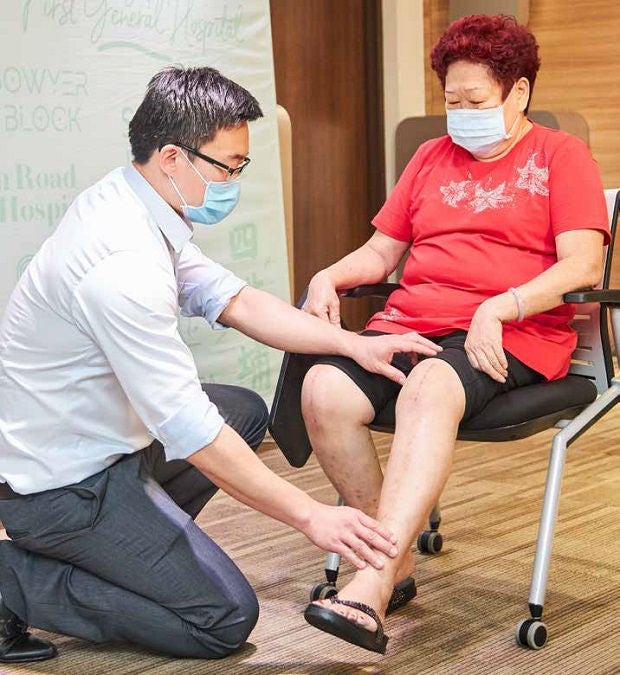
An enhanced recovery
programme, along
with a new surgical
technique for total knee
replacement surgery,
gets patients out of
hospital within the day.
Within hours of her total knee replacement surgery, Mdm Tay Mee Tiang was able to walk. The 64-year-old was discharged and back in the comfort of her own home the same day.
Typically, patients who undergo knee replacement surgery take three to four days to recuperate at the hospital. But Singapore General Hospital (SGH) is able to shorten this to just 23 hours with its enhanced recovery programme, which includes a new surgical method. The hospital is the first in Asia to offer same-day total knee replacement surgery.
“The programme allows the procedure to be done as a day surgery and reduces postoperative physical and psychological stress to patients. This reduces their recovery time and financial burden,” said Dr Jerry Chen, Consultant, Department of Orthopaedic Surgery, SGH.
It is especially relevant during the current pandemic, as a shorter hospital stay for eligible patients means a smaller chance of catching the virus, he added.
The programme was piloted in August 2019 with 50 patients. Elective surgery resumed in September 2020, and since then to January 2021, more than 200 patients have benefited from the programme. SGH sees about 1,800 total knee replacement patients a year, and about half could benefit from the programme.
Total knee replacement surgery is commonly performed on patients with end-stage knee arthritis. Patients eligible for the programme attend a Joint Replacement Class to prepare them for what to expect during and after the surgery.
Conducted by a multidisciplinary team on the same day of their pre-op assessment, the session teaches them rehabilitation exercises as well as pain management and wound care. This aims to ease patients’ anxiety, and to encourage them to walk short distances with the help of a physiotherapist soon after surgery.
A new surgical technique promotes better recovery as it aligns the artificial knee to the patient’s natural leg orientation.
“The kinematic-alignment technique restores the patient’s anatomy to how it was before arthritis had set in — whether bow-legged, knock-kneed or somewhere in between — and that speeds up recovery,” said Dr Chen.
Post-op pain, nausea and vomiting are minimised through the use of spinal anaesthesia, instead of general anaesthesia. Returning to the hospital for outpatient physiotherapy and wound dressing changes can be a worry for patients, especially those without a carer to bring them.
With the enhanced recovery programme, patients continue to be cared for after discharge. Home visits are conducted by physiotherapists in the first week, during which they help build patients’ confidence to get up and go about with their new knee. For instance, they walk with them to nearby coffee shops to buy their meals.
Community nurses visit in the second week to check their wound dressing, vital signs, and general well-being. Should patients have concerns, they can call a hotline.
“Sometimes patients experience pain and swelling of the knee joint. These are to be expected, and the nurses will remind them to ice their knee,” said Dr Chen.
To date, none of the patients on the programme have needed readmission within 30 days. Only patients who are generally fit, and are able to walk independently with a walking aid, get in and out of bed on their own, and climb stairs are eligible for the programme.
Keep Healthy With
© 2025 SingHealth Group. All Rights Reserved.



















